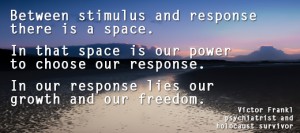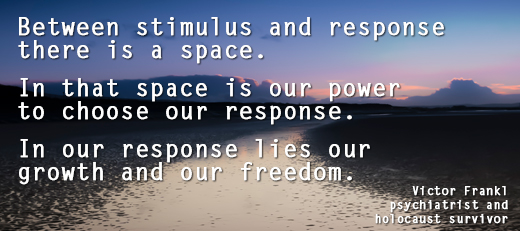Responding vs. Reacting
July 2016 Insights
Though the words respond and react are similar, the difference between the two is quite significant. When you react, you are being controlled by outside circumstances, whether it be a difficult situation or person. When you respond, however, you are in control of yourself, of your emotions. Unfortunately, many people misinterpret what it means to be in emotional control and believe the key to responding vs. reacting is all and only about keeping our feelings in check. Yes, of course the ultimate outcome we want is to manage our emotions to allow us to respond rather than react but not at the cost of spiting ourselves the awareness and understanding of how we feel by brushing our feelings under the rug just to keep ourselves in line. It is actually through a greater awareness and understanding of our feelings that we can then become smarter emotionally, express ourselves more effectively, and lessen the tendency to fall prey to living at the effect of our emotions.
 So how do we develop response consciousness and assist ourselves in becoming more “emotionally intelligent” rather than become “emotionally hijacked” when faced with challenging, button pushing circumstances and people. First and foremost we have to get in touch with how we feel, I mean really feel on a more regular basis so we get to know the difference between being in emotional control verses not. Set your phone to go off once or twice a day and start becoming more emotionally aware of how you feel. Ask yourself on a scale of 1 to 10 how in control are you of your emotions at that given time? What are you feeling physically? What emotions are you experiencing, and what thoughts are you having?
So how do we develop response consciousness and assist ourselves in becoming more “emotionally intelligent” rather than become “emotionally hijacked” when faced with challenging, button pushing circumstances and people. First and foremost we have to get in touch with how we feel, I mean really feel on a more regular basis so we get to know the difference between being in emotional control verses not. Set your phone to go off once or twice a day and start becoming more emotionally aware of how you feel. Ask yourself on a scale of 1 to 10 how in control are you of your emotions at that given time? What are you feeling physically? What emotions are you experiencing, and what thoughts are you having?
It is thru this conscious commitment to becoming more emotionally aware that you will then learn about what is supporting or detracting from your ability to remain in emotional control. Learning what triggers you to react opposed to respond will promote more proactive behavior. It is within that awareness that you can then stop, breathe and assess what is really going on and bothering you. Consider what story you may be telling yourself that’s eliciting the annoyance and causing your buttons to be pressed. So in the bigger scheme of things you will have a greater likelihood to respond rather then revert to a knee jerk reaction.
Often I suggest clients to keep a “trigger/button pushing” journal so over time, it will be easier to create action plans to deal with potential experiences that cause us not to feel in emotional control and identify what needs to be addressed at the core to remove the button all together.
Remember, you don’t have to attend every argument or drama you are invited to!
“Rather than being your thoughts and emotions, be the awareness behind them”
-Eckhart Tolle-
Wishing You Always
The Best Of Success
-Holly-
